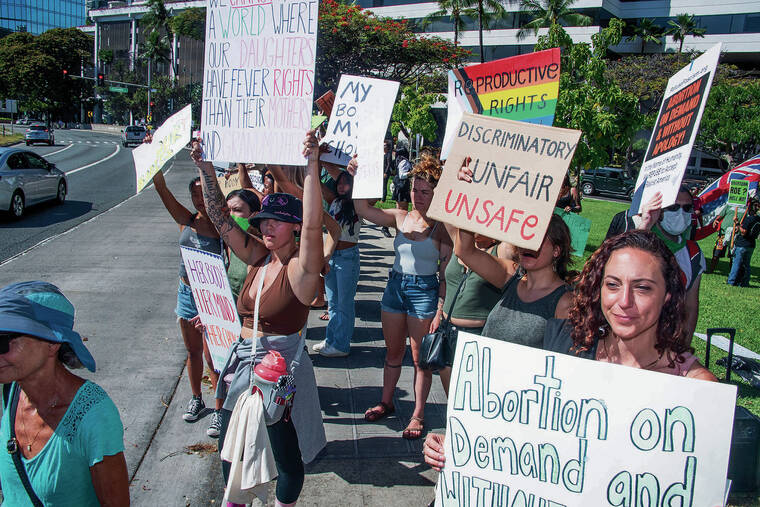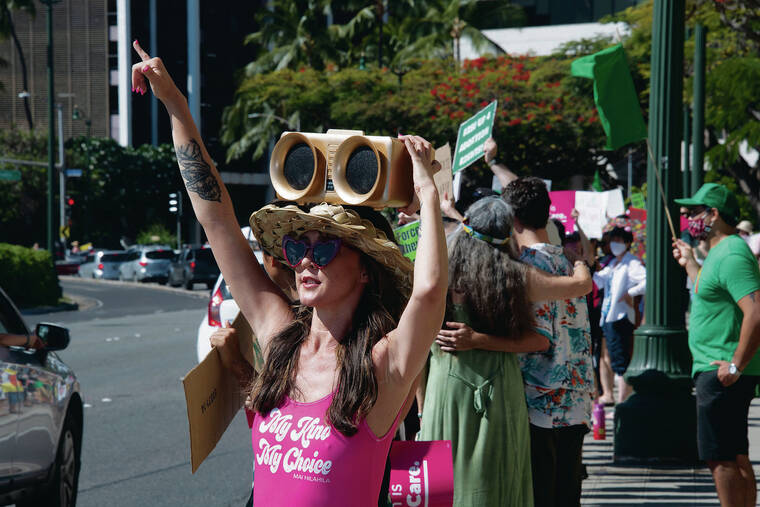As news broke Friday that the U.S. Supreme Court had overturned Roe v. Wade, eliminating the constitutional right to abortion, Hawaii’s political leaders swiftly condemned the decision in fiery rhetoric. Congressman Ed Case called the decision “tragic,” while U.S. Sen. Mazie Hirono said it was a “horrific day in America.”
Gov. David Ige, who called the decision “outrageous,” assured women in Hawaii that they “will continue to have access to the health care they need, and that includes abortion.”
Nearly half of states immediately enacted bans on abortion, or are poised to do so, following Friday’s court decision, which gives states the power to ban or heavily restrict the termination of a pregnancy.
Hawaii leaders say they are resolute in preserving women’s right to abortion, which is enshrined in state law. But abortion providers say the state’s strong legal protections belie the experience of many women in Hawaii, particularly on the neighbor islands, who have struggled to access abortions, and that Hawaii needs to pay more attention to improving access, especially in light of the Roe decision, which has pushed the issue of reproductive rights to the forefront of political discussions.
“I think in Hawaii we live in a bubble where we feel as though abortion is very well-supported, but there are still so many areas where people are struggling to access care,” said Dr. Shandhini Raidoo, a board certified obstetrician-gynecologist who also trains medical students on abortion care.
The number of health care facilities in Hawaii providing abortions has dwindled over the decades. In 1970, there were 10 hospitals providing the procedures throughout the state when Hawaii decriminalized it, according to a 1971 study Opens in a new tab. Now, there are no abortion clinics on Kauai, Molokai and Lanai, and just one in Hilo on Hawaii
island. The majority of abortions in Hawaii are performed by a small cohort of doctors at a few clinics, primarily at the Women’s Options Center Opens in a new tab in Honolulu and two Planned Parenthood clinics, one on Oahu and one on Maui, according to doctors.
But even those services can be limited. At Planned Parenthood’s Maui clinic in Kahului, surgical abortions are available only every couple of weeks when doctors from Oahu fly over to provide the care because there is no Maui doctor on staff.
The few obstetrician-gynecologists who provide most of those services say there are likely other ob-gyns in Hawaii who will provide abortions to established patients, but it’s hard to say how many, and it’s unlikely they will accept new patients who are seeking to terminate a pregnancy. It’s also hard to figure out who the providers are.
“If you are a patient looking for a provider, it’s hard to find sometimes,” said
Dr. Bliss Kaneshiro, a board-certified obstetrician-gynecologist who provides the full spectrum of women’s reproductive care, including abortions. “That’s one of the big, big barriers, just knowing where to look. It’s not super clear online where you go, and I know a lot of people spend time calling multiple offices.”
There are also more
“crisis pregnancy centers” listed in Hawaii than abortion clinics. The pregnancy centers, which are usually religion-based, have been slammed by Planned Parenthood and other groups for deceptive practices and providing women false information about the physical and emotional risks of abortion.
Women seeking abortions often don’t realize the crisis pregnancy centers are not abortion clinics and that their purpose is to persuade them not to terminate their pregnancy. That can further delay care.
THE SHORTAGE of abortion providers disproportionately impacts Hawaii’s rural and low-income residents who may have to travel from the neighbor islands to Oahu to terminate a pregnancy. The trip can cost hundreds of dollars in air fare and hotel costs, which can double if they need a followup appointment, and they often have to arrange child care and take time off work.
That can erode women’s privacy in what is often a deeply personal decision.
“I think the other big problem with that, too, is the lack of privacy, that if you are traveling off your island and having to tell your family and your employer, people don’t necessarily have the privacy or confidentiality about that decision that they may like,” said Raidoo.
Early on during the COVID-19 pandemic, when there were stringent restrictions on travel, the dearth of doctors offering abortions on the neighbor islands came into sharp
focus.
“We have a law that makes abortion legal, but during the pandemic people couldn’t access it,” said Rep. Linda Ichiyama (D, Salt Lake-Moanalua Valley), who is a member of the Women’s Legislative Caucus. “You had to fly to Oahu and quarantine for 14 days and leave your family and possibly expose yourself to COVID, and that really, I think, brought the issue to the forefront.”
In response, Ichiyama introduced House Bill 576, which was signed into law by Gov. David Ige last year. The measure authorizes advanced practice registered nurses to perform abortions.
However, abortion providers say that so far the measure hasn’t had the intended effect, in part because eligible nurses aren’t undergoing training.
The shortage of abortion providers can result in long waits in scheduling the procedure, which can increase the emotional distress for women who have made up their minds to terminate a pregnancy and potentially limit their options.
During the first trimester, when the vast majority of abortions are performed, women have the option to undergo a medication or surgical abortion. But after 10 weeks, a surgical abortion is usually the only option. Doctors say both procedures are very safe and quite simple.
A surgical abortion, while invasive, can take five to 10 minutes, while women can take so-called abortion pills at home. But after the first trimester, abortions become more complicated.
Planned Parenthood didn’t respond to questions this week about wait times to schedule an appointment. But its online appointment system indicated that the first available appointment for a medication abortion at its Honolulu clinic wasn’t for three weeks, while the wait time for a surgical abortion was 11 days.
At its Kahului clinic, the wait time for a surgical abortion was three weeks, while the online system redirected patients to its
Honolulu clinic for a medication abortion.
Providers say telemedicine and a December decision by the U.S. Food and Drug Administration that allows abortion pills to be sent through the mail is one bright spot that is already expanding access in Hawaii.
A number of local clinics are providing this option, as well as companies such as Abortion on Demand Opens in a new tab, which operates in states, including Hawaii, where telemedicine for abortions hasn’t been banned. Hawaii residents can receive the pills as soon as a couple of days.
PROVIDERS SAY there are multiple reasons why abortion has been limited, including burdensome federal restrictions on dispensing abortion pills. In some cases, hospitals, clinics and private practice groups have chosen not to offer abortions, while certain clinics face federal funding restrictions.
For instance, Hawaii’s 17 federally qualified health centers Opens in a new tab, such as the Waianae Coast Comprehensive Health Center on Oahu, Bay Clinic on Hawaii Island and Hana Community Health Center on Maui, serve the state’s medically underserved areas and are required to provide comprehensive primary care services.
While the clinics provide a wide array of family planning services, from contraception to prenatal care, they don’t provide abortions because doing so would risk federal funding.
Erik Abe, policy and public affairs director for the Hawaii Primary Care Association, which represents the state’s community health centers, said the federal funding prohibitions have been “like a brick wall” when it comes to offering abortions.
“It’s been really problematic. If anything, FHQC’s are caught between a rock and a hard place,” said Abe. “The majority of our practitioners are all in support of a woman’s right to choose. Decisions on family planning have huge impacts on the social determinants of health for families and entire communities.”
But Abe said the loss of federal funds would devastate the health centers and their ability to provide primary care.
Hawaii is also among the majority of states that allow both institutions and individual health care providers to refuse to offer abortions Opens in a new tab, according to the Guttmacher Institute, a research group that supports abortion rights and tracks state laws.
Adventist Health Castle in Kailua doesn’t offer abortions for religious reasons,
a spokesperson told the
Honolulu Star-Advertiser. Maui Memorial Medical Center has a policy of allowing abortions only in the event of a medical emergency.
Hawaii Pacific Health and The Queen’s Health Systems, two of Hawaii’s largest hospital systems, did not respond to questions about abortion access at their facilities.
Lance Segawa, CEO for the Kauai region of the Hawaii Health Systems Corp., which operates Kauai Veterans Memorial Hospital and Samuel Mahelona Memorial Hospital, among other facilities, said that surgical abortions are not offered but that doctors will provide medication abortions for patients if they request them.
Segawa said he didn’t know why surgical abortions aren’t offered.
“It has never come up, so I never thought about it,” he said.
Segawa said a full accounting of the available resources in Hawaii was needed. “We are all over the map,” he said.
Kaiser Permanente was the only provider that said it routinely offers abortions as part of its women’s health services, a commitment it reaffirmed following Friday’s Supreme Court decision.
HANA HEALTH Executive Director Cheryl Vasconcellos, who was executive director of Hawai‘i Planned Parenthood until the mid-1990s, said that attracting abortion providers has always been a problem because of the controversy surrounding the subject. She said Planned Parenthood had to battle 13 lawsuits before it launched abortion services in Hawaii.
“The politics around it are just incredible,” she said. “There needs to be a more coordinated effort to advocate on behalf of women’s rights and women’s reproductive health care.”
Doctors who do provide abortions say they are frustrated that more of their colleagues don’t provide that option for women as part of their family planning, noting that 1 out of every 4 women will undergo an abortion in their lifetime.
They say that’s sidelined abortions from mainstream medicine, increasing the stigma of terminating a pregnancy even though Hawaii residents overwhelming support a woman’s right to choose. Two-thirds of Hawaii adults say that abortion should be legal in all or most cases, according to the Pew Research Center.
Dr. Reni Soon, chair of the Hawaii section of the American College of Obstetricians and Gynecologists, who is among the Oahu doctors who fly to Maui to provide abortions, said Hawaii’s health care community should be doing more to increase access.
“When you restrict access you are actually increasing pregnancy-related mortality. That’s a fact, that’s not my political view,” said Soon. “I would love to see more hospitals, more of our health care institutions making a commitment to increasing access to abortion care.”
Soon said the political environment and marginalization of abortion takes a toll on her patients.
“The negative stigma, it’s huge,” said Soon. “It’s heartbreaking when I see patients who think that they are doing something wrong, think that they are doing something illegal.”
Soon says she tries to provide her patients with as much compassion as she can to support their choices and counter any negative influences.
“The thing that we all need to remember, I think, is that these patients who I take care of that are seeking abortions are all of our neighbors. They are the people working at the grocery store, at the bank, the firefighters, the bus drivers or the teachers,” said Soon. “And many of them are already parents and they know what it takes to raise a child, and they are making the most loving decisions for them and their families.
“And who are we to tell our neighbors how to live their lives and what decisions are best for them and their families?”




